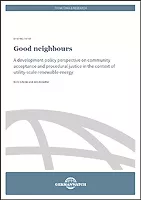
Simply because utility-scale renewable energy (RE) projects substitute for fossil fuel plants does not per se imply that they will result in sustainable, equitable or even pro-poor development outcomes in the environments in which they are embedded and on the people they serve. As a consequence, it is increasingly recognized that achieving community acceptance may be a constraining barrier to the further progress of converting current unsustainable energy infrastructures into a sustainable energy system based on high shares of RE.
This paper highlights that procedural justice and engaging meaningfully with local communities in the vicinity of utility-scale RE projects should be regarded as a long-term investment into a mutually sustainable neighborhood: strong communities benefiting from RE projects and a sustained license to operate for the full lifespan of RE projects.
